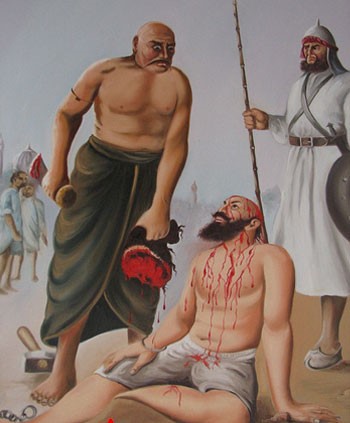
A respected figure in Sikh history, Bhai Taru Singh Ji is known not only for his extraordinary faith but also for his devotion to Sikh principles and service to humanity. His life story is a proof of the values, devotion and justice, all of which are essential for Sikhs.
Early Life & Family
Bhai Taru Singh Ji was born in the village of Puhla in the early 18th century when Sikhism was emerging. His family, deeply rooted in Sikh traditions, instilled in him the core values of Sikhism from a young age. His parents Bhai Jodh Singh and Mata Dharam Kaur were devout Sikhs who supported his spiritual growth.
Devotion & Spiritual Inclination
From his early years, Bhai Taru Singh Ji showed a deep inclination towards Sikhism. His unwavering faith in the teachings of Guru Nanak Dev Ji and his followers fueled his spiritual journey. He spent much time studying Sikh scriptures and immersing himself in the principles of Sikh philosophy.
Sikh Values & Teachings
Bhai Taru Singh Ji fully accepted the teachings of the Gurus and aimed to be a living example of Sikh values in action.He became a beacon of faith and compassion in the Sikh community, which encouraged him to help those who were in need. His firm love for the Sikh Gurus and devotion to Sikh values made him a beloved figure among others .
Contribution & Services
The life of Bhai Taru Singh Ji characterized the principles of Sikhism. He was dedicated to selfless service and cherished the values of equality, compassion and community welfare. He was actively involved in the community kitchen, Langar, where he helped prepare and serve free meals to everyone, regardless of their social or economic status.
The Turban Controversy
One of the turning points in the life of Bhai Taru Singh Ji was the infamous "Turban Controversy". During the oppressive rule of Zakaria Khan, the Mughal governor of Punjab, Sikhs were targeted for their special identity, including their turbans. Bhai Taru Singh Ji, firm in his faith, refused to remove his holy turban even in the face of brutal persecution.
The Sacrifice
Sikhs faced severe persecution under the Mughal rulers who tried to end Sikhism. One of the repressive measures imposed was a tax on Sikhs and an order to cut off their hair, which had great religious significance for them. The purpose of these activities was to force Sikhs to reject their Sikh identity.
During this time , Bhai Taru Singh Ji remained committed to his Sikh identity and beliefs. He refused to follow the authorities order to cut his hair.As a result of this refusal , he was arrested and severely tortured . The authorities ordered him to cut his hair by force. Bhai Taru Singh was firm and stood on his decision. He said, "My hair is inseparable from my scalp." Zakariya Khan(the then governor of Punjab) called the cobbler and ordered him to cut the scalp of Bhai Taru Singh with his chisel. During the torture of scalping, Bhai Sahib could only be heard reciting Japji Sahib. After that he was taken to Lahore Fort and imprisoned and tortured again to die slowly
Legacy
On 1 July 1745, Bhai Taru Singh gave up his mortal body .
His sacrifice established a symbol of sikh strength in the face of religious persecution.In the records of Sikh history, Bhai Taru Singh Ji's sacrifice tells the story of courage, faith and firm devotion, reminding us that the human spirit can rise above the most difficult situations .
His memory lives on, reminding us of the timeless principles of love, justice and faith that lie at the heart of Sikhism.
Conclusion
In conclusion, the life of Bhai Taru Singh Ji exemplifies the basic principles of Sikhism - devotion, dedication and faith. His spirit in the face of adversity and ultimate sacrifice for his faith left an indelible mark on Sikh history. Bhai Taru Singh Ji's legacy is a timeless source of inspiration that calls upon Sikhs and all people to uphold their beliefs and respect the values of justice, equality and freedom.
The biography of Bhai Taru Singh Ji is not a chapter of the past but a timeless source of inspiration. His commitment to Sikh values and willingness to sacrifice for them is an example of the power of faith.
Note- We have made every effort to ensure the accuracy and reliability of the information provided. However, this content is intended for informational purposes only and reflects historical and cultural perspectives. DVN does not assume responsibility for any disputes or actions that may arise from the use of this content. If you believe any information is incorrect or misleading, please contact us.